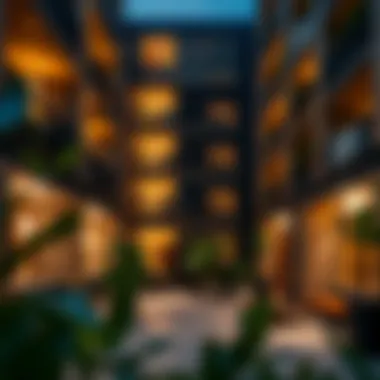Exploring Shared Apartments in Dubai: Insights and Trends


Intro
Shared apartment living in Dubai has gained substantial traction in recent years, particularly among expatriates and young professionals. As the city continues to burgeon with opportunities and a vibrant lifestyle, the concept of sharing an apartment offers a practical solution to navigating the high living costs. This article immerses into this dynamic sector of the real estate market, shedding light on the primary drivers behind the rise of shared accommodations, the potential pitfalls, and the advantages at play.
In a metropolis like Dubai, where diverse cultures intermingle, shared living arrangements can be particularly enticing. It’s not only about splitting rent; it's also about sharing experiences, networking, and building a community. In this deep dive, we’ll analyze local market trends, provide property investment insights, and share practical tips for those considering this increasingly popular rental option.
Market Trends
Current Market Analysis
The market for shared apartments in Dubai is vibrant and growing. With a wave of skilled expatriates moving to the city, demand has shifted significantly toward shared accommodations. Historically, most affluent areas, such as Dubai Marina and Jumeirah Lake Towers, were dominated by spacious luxury flats. However, these neighborhoods are seeing a surge in shared arrangements as individuals seek to minimize living costs while ensuring access to prime locations.
As noted by real estate experts, the average rental price in Dubai has remained steady, but the interest in shared living is helping stabilize the market. Many tenants find that living with roommates provides them more room in prime locations, allowing them to better enjoy the lavish lifestyle Dubai offers. The rising popularity of digital platforms in matching potential roommates has only fueled this trend, making it simpler than ever to find compatible cohabitants.
Future Predictions
Looking ahead, the shared apartment market in Dubai is poised for continued growth. As the global economy undergoes fluctuations, individuals—particularly young professionals—are expected to gravitate towards cost-effective living options. Analysts predict that areas such as Downtown Dubai and Al Barsha will witness increasing interest for shared living, catering to a diverse group of tenants from tech startups to creative fields production.
Real estate professionals anticipate a greater variety of apartment types in shared living arrangements as landlords recognize the potential for increased profitability. This could include furnished versus unfurnished options, along with more modern designs catering to a younger demographic.
"The shift in rental preferences towards shared living is not just a temporary trend; it mirrors broader economic and social changes impacting urban living." - Real Estate Expert
Property Investment Insights
Types of Investment Properties
When exploring the potential for investment in shared apartments, understanding the types of properties can be crucial. Common options include:
- Furnished Apartments: Favorable for expatriates who often prefer to avoid the hassle of buying furniture.
- Studios: Small, efficient spaces that increase affordability while providing privacy.
- Multi-bedroom units: Larger spaces that can cater to multiple tenants, maximizing rental income.
Financing Options and Tips
Investors considering entering the shared apartment scene should explore various financing options:
- Traditional Mortgages: Many banks offer competitive rates for properties in Dubai, making it easier to finance a shared accommodation.
- Partnerships: Sharing financial responsibility with others can lower individual risk while broadening investment opportunities.
For those looking to navigate the marketplace, it’s recommended to engage with local real estate agents who specialize in shared living. Their expertise can significantly reduce the uncertainty in choosing the right property and navigating tenancy laws.
Understanding Shared Apartment Living
In the bustling metropolis of Dubai, sharing apartments is more than just a passing trend; it's become a viable lifestyle choice for many residents. This section delves into the essence of shared apartment living, highlighting its significance in the broader context of Dubai’s housing dynamics.
Living in shared apartments can provide not only financial relief but also much-needed social interaction, particularly in a city known for its vibrant expatriate community. The reality is, for many, especially younger individuals and newcomers, navigating the housing market can feel like climbing a mountain. Thus, understanding shared living provides a foundation for making informed choices that align with one's budget and lifestyle.
Definition of Shared Apartments
A shared apartment is basically when several individuals live together in one unit, splitting various costs like rent, utilities, and services. Typically, these setups can vary from two roommates to larger groups sharing a single property. It’s a bit like hosting a small gathering that lasts indefinitely—everyone has their space while sharing the communal areas.
Often, these arrangements are most appealing for young professional expats and students who not only seek affordable living options but also look to build connections in a foreign land. While each individual usually has their own bedroom, common areas like kitchens, bathrooms, and living rooms are shared. This dynamic encourages a certain camaraderie, fostering friendships that may otherwise be difficult to form in a sprawling city.
The Rise of Shared Living
The rise of shared living in Dubai reflects broader societal changes and economic conditions. Over the past few years, in response to high rents and a challenging real estate market, more individuals have tilted towards this option. It’s particularly noticeable among expats who are often in transition, looking for accommodations that are more than just four walls.
Several factors contribute to this trend:
- Economic Sensibility: With soaring rents, the cost-effectiveness of sharing is hard to ignore. Many residents are actively seeking to reduce living costs and keep disposable income for other essentials.
- Social Engagement: For many, especially those new to the city, shared apartments can provide an instant community. This is vital in a city where fleeting connections often happen.
- Flexible Living: Shared apartments offer adaptable living arrangements. Many expats appreciate the ability to find short-term leases, easily allowing transitions as jobs or circumstances change.
Observing these patterns could be telling for future investors and marketers as they look at Dubai's diverse real estate tapestry. With its mosaic of cultures converging, understanding shared apartment living not only shines a light on a key segment of the housing market but also provides insights into the lifestyle preferences of residents in this dynamic environment.
Demographics of Residents
Understanding the demographics of residents who inhabit shared apartments in Dubai is crucial for several reasons. Firstly, it sheds light on the unique needs and preferences of different groups, ultimately allowing property managers, investors, and other stakeholders to tailor their offerings effectively. The demographic profile influences everything from rental pricing to the amenities provided, and even the overall atmosphere of a shared living space. Furthermore, knowing who lives where in Dubai can help anticipate trends in demand and inform strategies for efficient urban planning.
Expatriates in Dubai
Expatriates form a significant portion of Dubai's population. With various nationalities calling the emirate home, the city blooms into a spectrum of cultures. Often, these expatriates are drawn to the city for career opportunities, with many of them opting for shared apartments as a more economical choice compared to standalone units. Shared living provides expatriates not only a place to stay but also an immediate social network in a new environment. Many expatriates value the chance to connect with others from their home countries or different cultures, making shared apartments a natural fit.
It’s worth noting that shared apartments help ease the transition into a foreign culture by providing a support system. Most shared apartments offer amenities and communal living spaces that allow residents to bond over shared experiences—be it a Sunday brunch or a weekend movie night.
Young Professionals and Students
Young professionals and students represent another important demographic in Dubai’s shared apartment landscape. With the rising cost of living, a growing number of young people choose to share living spaces to curtail expenses. For students, shared apartments serve as a golden opportunity not only to save money but also to socialize and collaborate academically. Around campuses like the University of Wollongong in Dubai or the American University in Dubai, shared apartments are highly sought-after, as they provide easy access to educational facilities and city amenities.
Young professionals benefit from shared living as they often work in fast-paced environments that demand flexibility. In these settings, shared apartments offer convenience, such as free Wi-Fi and wellness features that cater to a modern lifestyle. Also, communal kitchens and living rooms allow young tenants to unwind after a long workday or a hectic week of studies, effectively creating a sense of community.
Tourists and Short-Term Renters
The allure of Dubai extends beyond its permanent residents, as many tourists and short-term renters also dive into the shared apartment market. Whether it's a business trip or a holiday getaway, travelers often find shared apartments suitable due to their affordability and the chance to experience life like a local.
This category usually involves staying in shared accommodations that grant access to essential services and resources without breaking the bank. Typically located near popular attractions or business centers, these apartments cater to both leisure and work purposes. Additionally, the growing trend of co-living spaces designed specifically for short-term stays offers a unique blend of privacy and community engagements, attracting international travelers seeking a home-like setting during their visits.


This blend of diverse residents creates a vibrant community in shared apartments, enriching the living experience through various cultural exchanges.
In summary, the demographic landscape of shared apartments in Dubai reflects a microcosm of the city's broader population. From expatriates and young professionals to adventurous tourists, understanding these groups allows stakeholders to cater to their specific needs and preferences, ensuring that shared living remains a viable and attractive option in this dynamic market.
Benefits of Shared Apartments
Shared apartments in Dubai present numerous advantages that can significantly enhance the living experience for various types of residents. As this city continues to draw people from across the globe, understanding the benefits of shared living becomes crucial for those considering this option. These benefits range from financial savings to opportunities for social engagement, making it an attractive choice for expatriates, professionals, and students alike. Below, we explore the key aspects of shared apartments that contribute to their growing popularity.
Cost-Effectiveness
One of the primary draws of choosing a shared apartment is cost-effectiveness. With Dubai being notorious for its high living costs, splitting rental expenses offers considerable relief.
Imagine the difference in monthly totals when two or three people share a space instead of bearing the full rent burden individually. For instance, a three-bedroom apartment in a sought-after area might list for 6,000 AED a month. When this cost is shared among three tenants, each pays only 2,000 AED, significantly easing the financial strain. Add to this the shared expenses for utilities and internet, and you can save a pretty penny without compromising comfort.
"Living in a shared apartment allows individuals to enjoy the benefits of a prime location without breaking the bank."
Moreover, this model encourages a social safety net. In a case of unexpected situations like job loss or personal emergencies, having co-tenants can provide a vital support system where resources can be pooled to help weather the storm.
Social Opportunities
Another notable benefit of living in shared apartments is the opportunity to expand one’s social network. In a bustling metropolis like Dubai, meeting new people can sometimes feel like a tall order, especially for newcomers. Living with others creates a natural environment for building connections, friendships, and sharing experiences.
The shared living dynamic often leads to spontaneous conversations and group activities that you might not engage in while residing solo. For example, housemates might organize dinner nights or movie marathons, offering a sense of community and companionship that is particularly valued in an unfamiliar city. This social aspect can fill the gap of homesickness and create memories that transform relative strangers into lifelong friends.
Also, networking opportunities abound within shared accommodations as residents might come from diverse professional backgrounds. Engaging in discussions about various industries can open doors to new friendships or career prospects, enriching the overall living experience.
Flexibility and Convenience
Flexibility is another compelling factor that influences many to consider shared apartments. The rental market in Dubai can be quite demanding, and signing a lease for a lengthy term can feel intimidating. However, many shared living setups offer more adaptable lease agreements.
This means residents can often sign month-to-month leases or agree on shorter terms that cater to their needs. This convenience is particularly beneficial for young professionals or expats who may find themselves in transitional stages—whether on a work visa or pursuing educational opportunities.
Additionally, shared apartments can come fully furnished, allowing tenants to move in without the hassle of purchasing or transporting furniture. This setup is ideal for those looking to simplify their relocation process.
Challenges of Shared Apartment Living
Navigating the waters of shared apartment living in Dubai presents its own unique set of challenges. This doesn't just impact the day-to-day experiences of tenants but also shapes the market dynamics. Understanding these challenges is crucial for anyone considering this living arrangement. Whether you are an expat looking for an affordable place, a young professional starting out, or a long-term resident, being aware of the hurdles can help inform choices and set realistic expectations.
Compatibility Issues
Compatibility among housemates is one of the most persistent challenges in shared apartment living. Everyone comes from different backgrounds, cultures, and lifestyles. This can lead to misunderstandings or conflicts that might disturb the peace in the home. For example, a night owl housemate might clash with an early riser over noise levels.
It's essential to communicate openly about lifestyle habits when roommates move in together. Setting clear expectations from the get-go can help minimize potential disputes. A simple conversation about daily routines, sleep schedules, and personal preferences can go a long way in fostering harmony. When compatibility issues arise, they often stem from lack of communication, highlighting why it's so important to establish a rapport before signing agreements.
Shared Responsibilities
When living in a shared apartment, responsibilities are not just personal, they are collective. Each tenant must contribute to the upkeep and maintenance of common spaces, which can sometimes lead to friction. People have varying standards when it comes to cleanliness or organization, and disagreements can quickly spiral out of control.
To address this, establishing a cleaning schedule or sharing chores can be beneficial. Here’s a quick look at common responsibilities:
- Cleaning common areas like the living room and kitchen
- Paying bills on time
- Managing groceries and shared supplies
Failure to communicate about these responsibilities can lead to resentment between housemates. Setting clear rules can ease the load and ensure everyone is on the same page.
"A chain is only as strong as its weakest link." This saying rings true in shared apartments, where the effectiveness of group living depends heavily on the cooperation of all tenants.
Privacy Concerns
Privacy is perhaps the most delicate topic when it comes to shared living. In essence, you’re sharing not just a living space, but also times when you wish to unwind or be alone. The challenge arises when someone encroaches on another’s personal space, whether intentionally or unintentionally.
To combat these concerns, it’s advisable to establish boundaries early in the rental relationship. Some residents may prefer a quiet home after a long day, while others might enjoy hanging out late into the night. Being transparent about these preferences can help protect everyone’s sense of privacy and comfort.
Market Trends Influencing Shared Apartments
Understanding the market trends influencing shared apartments is crucial for anyone involved in this vibrant sector of Dubai's rental landscape. As the city continues to grow and attract a mix of residents, these trends reflect subsequent changes in demand, evolving preferences, and economic shifts. Knowing these elements allows investors, expatriates, agents, and buyers to navigate the complexities of the real estate market more effectively.
Demand Fluctuations
In Dubai, demand for shared apartments can be likened to the ebb and flow of the tide. It is constantly changing based on various factors, including the arrival of new residents, seasonal tourism peaks, and job market fluctuations.
- Seasonal Influences
- Job Market Conditions
- Cultural Shifts
- During peak seasons, particularly from October to April, accommodation becomes a hot commodity as tourists and new expats flood into the city. The influx leads to increased demand for shared living options, which are often more affordable than standalone rentals.
- Conversely, during the hotter months, typically from May to September, there is often a noticeable dip in interest as many residents travel or opt for shorter rentals.
- Economic opportunities play a pivotal role in shaping demand. As industries grow and new jobs emerge, particularly in technology and tourism, the need for shared apartments increases. For instance, when a new tech firm sets up in Dubai, it's typical to see an influx of young professionals seeking affordable living arrangements.
- Changing lifestyle preferences are also causing shifts in demand. Many millennials and Gen Z individuals prioritize community and shared experiences over traditional living arrangements. They seek engaging social opportunities within their living spaces, making shared apartments an attractive option.
"In Dubai, shared living is more than just a trend; it’s a lifestyle choice that reflects the evolving nature of community living."
Impact of Economic Conditions
The economic environment directly influences the shared apartment market in Dubai. Several factors highlight how the economy shapes the rental landscape:


- Tourism and Hospitality Growth: The tourism sector's robust performance promotes demand for short-term rentals and thus shared apartments. Hotels often reach their capacity during peak seasons, leading both travelers and expats to seek alternative accommodations.
- Local and Global Economic Stability: The overall economic stability of the UAE impacts confidence among potential renters. When economic conditions are favorable, many are inclined to settle down in shared apartments due to job security, which naturally leads to a stable rental market.
- Inflation and Cost of Living: Rising costs can drive potential tenants towards shared living situations, as they tend to be more budget-friendly than traditional rental agreements. For example, if inflation rates increase, fewer residents may afford standalone apartments, pushing demand upward for shared spaces.
In summary, understanding market trends influencing shared apartments allows all stakeholders to anticipate shifts and make informed decisions. Recognizing that demand is influenced by an array of factors helps investors and potential renters alike align their choices with the larger economic landscape.
Popular Neighborhoods for Shared Apartments
When it comes to shared apartment living in Dubai, the neighborhood you choose can make a world of difference. Each area offers its own unique vibe, convenience, and amenities that cater to different lifestyles. Understanding these popular neighborhoods helps residents make informed decisions about where to live, maximizing not only comfort but also affordability. Here’s a closer look at several key areas.
Dubai Marina
Dubai Marina is often hailed as one of the most glamorous neighborhoods in Dubai. With its stunning views of skyscrapers and the marina itself, it’s an area where many expats and young professionals flock to. The abundance of modern high-rises means plenty of choices for shared apartments.
- Walkability: The marina is designed for pedestrians, which adds to the charm. Residents can take leisurely strolls along the promenade, enjoying cafes and boutiques.
- Amenities: There are a plethora of places to eat, workout facilities, and shopping centers which cater to a social lifestyle.
- Public Transport: The Dubai Metro and tram system make it easy to navigate to other parts of the city.
The mix of vibrant nightlife and tranquil waterfronts makes Dubai Marina a hot spot for shared living, providing both excitement and relaxed living.
Jumeirah Lake Towers
A close neighbor of Dubai Marina, Jumeirah Lake Towers (JLT) offers a different flavor for residents. This area comprises 26 towers clustered around artificial lakes. JLT is popular among professionals looking for cost-effective housing without missing the essentials.
- Community Feeling: The layout of JLT encourages a sense of community, ideal for those looking to share an apartment.
- Affordability: You can find slightly lower rental prices compared to the glitzy Dubai Marina.
- Green Spaces: Parks and outdoor areas add a refreshing touch to this urban environment.
The blend of business and residential spaces makes JLT a balanced option for shared apartment seekers who appreciate proximity to work and leisure.
Downtown Dubai
As the heart of the city, Downtown Dubai is iconic and luxurious. Although living here might come at a premium, the experience is unmatched. The Burj Khalifa and the Dubai Mall are just the tip of the iceberg in this bustling area.
- Cultural Opportunities: Living in Downtown not only provides access to modern amenities but also cultural richness. Art galleries, theaters, and events are abundant.
- Networking: Ideal for professionals, it's a hub for networking opportunities, boosting career prospects.
- Transportation: With the metro linking to various parts of Dubai, getting around is straightforward.
Choosing to share an apartment in Downtown Dubai means being at the pulse of the city—everything you need is just a stone's throw away.
Deira
Deira represents a more traditional side of Dubai. Known for its markets—like the Gold Souk and Spice Souk—this area is a wonderful blend of culture, history, and modern living. It’s an often-overlooked gem for those seeking shared accommodations.
- Cost-Effective Housing: Often, rental prices in Deira are substantially lower than in other areas, attracting students and budget-conscious expats.
- Cultural Experiences: The neighborhood offers rich experiences with a variety of local shops and eateries showcasing Emirati culture.
- Accessibility: Major roads and the metro network make commuting to other parts of Dubai easy.
Deira stands out for those who appreciate local culture while enjoying the benefits of shared living.
Ultimately, the choice of neighborhood directly impacts one’s lifestyle when living in a shared apartment. With these options in mind, prospective residents can weigh their priorities, whether they lean towards social scenes, affordability, or cultural richness.
Cost Considerations
Understanding the costs associated with shared apartment living in Dubai is paramount for potential tenants. Renters should be savvy about both the initial financial commitment and ongoing expenses. This section unpacks these elements, emphasizing the significance of knowing what to expect when it comes to budgeting for this type of accommodation.
Rental Prices
In a city known for its opulent lifestyle, rental prices for shared apartments can vary significantly. We often see the difference in prices based on factors like location, amenities, and the type of shared living arrangement. For instance, a shared apartment in Dubai Marina might cost more than a similar setting in Deira, reflecting both the desirability of the area and the facilities provided.
On average, monthly rent can range from AED 1,500 to AED 3,500 per person, depending on the neighborhood and apartment specifications.
- Dubai Marina: Higher-end shared apartments cater to younger professionals seeking proximity to vibrant nightlife and beach access.
- Deira: Might appeal to budget-conscious expatriates and students, often featuring larger rooms for lower rent.
To navigate these price waters effectively, it’s essential to have a clear grasp of market trends and seasonal fluctuations. One should keep in mind that prices often dip in the summer months as many expatriates return to their home countries, making this an advantageous time for potential renters.
Additional Costs
Rent is not the only item on the financial checklist when considering a shared apartment. Various additional costs can quietly sneak into the budget. Some common extra expenses include:
- Utilities: Electricity, water, and internet can add between AED 200 and AED 500 monthly, per tenant, depending on usage. Split accordingly with housemates to ease the burden.
- Maintenance Fees: Sometimes, landlords will pass these charges onto tenants. Know these fees in advance to avoid surprises.
- Agency Fees: If utilizing a real estate agent to find a shared apartment, a fee might apply typically amounting to about 5% of the annual rent.
- Personal Expenses: Items such as household supplies and occasional communal gatherings can sum up. Having a small fund set aside for these expenses can go a long way in avoiding conflicts between housemates.
Considering all these elements is vital. Understanding both your rental obligations and additional expenses means you can manage your finances more effectively and enjoy your shared living experience without unexpected financial strain.
In summary, comprehensive financial planning that encompasses both rental costs and additional expenses is key to a trouble-free shared living experience in Dubai. Being informed about what to expect can prevent unpleasant surprises and foster a harmonious living environment.
Legal Aspects of Renting Shared Apartments
Understanding the legal framework surrounding shared apartments in Dubai is crucial for anyone considering this living arrangement. These rules not only guide tenants through their rights and responsibilities but also ensure a smoother renting process. Knowing what you’re up against legally can mitigate potential conflicts and pitfalls, especially in a city like Dubai where the real estate market has unique characteristics.
Tenancy Laws in Dubai
Tenancy laws in Dubai are regulated by the Real Estate Regulatory Agency (RERA). This body lays the groundwork for how rental agreements should be structured, the rights of landlords, and the protections offered to tenants. Being aware of these laws can enhance your living experience. For example, according to Article 9 of Law No. 26 of 2007, landlords are not allowed to raise the rent beyond a specified percentage unless justified.
Additionally, if you're looking for stability, you'll appreciate the stipulations surrounding eviction. Landlords must provide a written notice to tenants, detailing specific reasons for eviction, such as defaulting on rent or causing significant damage. The RERA Rent Increase Calculator can help in understanding permissible rent increases if they apply.
Rental Agreements
A rental agreement serves as a crucial document for both tenants and landlords in shared apartments. This agreement lays out the terms of the rental, including the duration, payment options, and conditions for termination. It's typically a good idea to have it documented and signed by both parties involved to avoid any misunderstandings in the future.
In Dubai, a standard lease can vary from one year to three years. Additionally, any alterations made by the tenants should be approved in writing by the landlord to keep things transparent. Prospective renters should read the fine print carefully, as any ambiguities can become a headache later on. Ignorance in this area can lead to regret, so doing due diligence here is key.
Rights and Responsibilities of Tenants


In the realm of shared apartments, knowing your rights and responsibilities is pivotal. As a tenant, you have a right to a safe and habitable living condition. This means that landlords must keep the property in good repair and address any issues promptly, such as plumbing leaks or electrical failures. Conversely, tenants are also responsible for maintaining cleanliness and upholding the property—no graffiti on the walls, please.
Here are some key points:
- Right to Privacy: Tenants should be free from arbitrary intrusions by landlords.
- Responsibility to Pay Rent on Time: This is a two-way street—failure to remit rent on time can result in penalties or eviction.
- Sharing Responsibilities: In a shared arrangement, it’s crucial to communicate openly with other roommates to establish who handles what chores or bills.
“Understanding your rights and responsibilities can make or break your living experience in a shared apartment.”
In any rental situation, awareness of legal aspects ensures that you not only protect your interests but also fosters a more collaborative and harmonious living environment. Those earmarking a space in the bustling life of Dubai should consider these factors fundamentally as a stepping stone to a hassle-free shared living arrangement.
Finding the Right Shared Apartment
Finding the right shared apartment in Dubai can feel like searching for a needle in a haystack. With various options available, understanding what fits best for individual needs is pivotal. Shared apartment living is not just about splitting rent, it's about finding a space that resonates with your lifestyle and offers the comfort of home while also fostering social connections. The importance of this search cannot be understated; it impacts day-to-day living experiences and influences overall satisfaction with shared living.
Several elements come into play when searching for the perfect shared apartment:
- Location: Proximity to work, schools, or social hotspots can greatly enhance quality of life.
- Cost: Finding an apartment that aligns with your budget while not compromising too much on comfort is essential.
- Roommates: Compatibility with housemates can be one of the most significant factors affecting your living experience.
When these elements are considered it becomes more manageable to navigate the plethora of options available.
Utilizing Online Platforms
In today's digital age, online platforms serve as the backbone for finding shared apartments. Websites such as Dubizzle, Property Finder, and Airbnb allow for a wide range of listings, making it easier to sift through options based on specific criteria like price and location. These platforms offer detailed descriptions and images, providing insights into the living conditions before you step foot inside.
- Filters and Searches: Use filters wisely to narrow down your choices. Look for key things like public transport access, the availability of amenities, and the overall vibe of the neighborhood.
- Reviews: Often, current or past residents share their experiences about the property. Their comments can provide a clearer picture of what you might expect.
However, caution is advised. Scams are prevalent, so always verify listings directly and trust your instincts when something feels off.
Social Media and Networking
Tapping into social media can also be a goldmine for finding shared apartments. Platforms like Facebook often have dedicated groups where landlords or current tenants post available spaces. Networking through platforms such as LinkedIn or even Reddit can uncover opportunities not listed on traditional rental platforms.
- Facebook Groups: Join groups that cater to expats or those specifically looking for shared living arrangements in Dubai.
- Meetups: Attend local gatherings or events to connect with individuals who are also searching. Some might have leads on available apartments or even a spare room.
Networking, while sometimes overlooked, can greatly enhance your search. Those who are already established in Dubai or shared living can offer valuable advice and insights, making the process less daunting.
"When searching for shared apartments, don’t just look for a place to stay; look for a place where you can feel at home. The right atmosphere and roommates can make all the difference."
In summary, the process of finding the right shared apartment in Dubai is nuanced and requires careful consideration and exploration. With online platforms and social networks at your disposal, the hunt becomes a more structured and less overwhelming endeavor.
Preparing for Shared Living
Preparing for shared living in Dubai is a foundational step that can shape a positive experience for all involved. This section delves into the necessity of setting clear personal and communal expectations and drafting house rules to ensure a harmonious living environment. Living with others can be a mixed bag; however, taking proactive measures can lead to a smoother journey. Here, we’ll explore two key aspects that can enhance the shared living experience: setting expectations and creating house rules.
Setting Expectations
Setting expectations is crucial before embarking on the shared apartment adventure. When roommates know what they can anticipate from each other, it helps in minimizing misunderstandings. The process can start with an open dialogue about each person’s lifestyle and habits, which is particularly vital in a cosmopolitan city like Dubai where cultural backgrounds can vary wildly.
- Communication is King: Be clear about your daily routines, cleanliness preferences, noise tolerance, and social habits. For example, if you’re an early bird who enjoys quiet mornings, mention this upfront to avoid any clashes with night owls who prefer late-night gatherings.
- Respect Boundaries: It's essential to discuss personal space. Knowing how to navigate each other’s needs for privacy can lead to mutual respect. Not everyone is comfortable with spontaneous visitations, so laying this groundwork prevents discomfort.
- Shared Interests vs. Lifestyle Choices: Finding common ground in hobbies or routines can be beneficial. If you and your roommate are both fitness enthusiasts, you might hit the gym together, but if one prefers a quiet night with a book, recognize and accept those differences diligently.
By setting these expectations early, future disputes can be avoided, saving all parties from unnecessary friction. Remember, the goal is to make shared living a rewarding experience for everyone.
Creating House Rules
Once expectations have been laid out, the next step in preparing for shared living is the creation of house rules. These rules should align with the visions set during discussions about expectations. While it may feel a bit formal, creating house rules is akin to drafting a roadmap for smooth coexistence. A clear agenda facilitates harmonious living.
- Cleaning Duties: Establish a cleaning schedule that all roommates agree upon. It could be a simple rotation or assigned tasks, but clarity on who does what when helps keep shared spaces tidy.
- Shared Utilities: Discuss how to handle grocery shopping and utility payments. Establish a method for sharing costs, whether it's through a shared app or passing around a cash jar at the end of each month.
- Guests and Social Events: If you’re living in tight quarters, it might be best to agree on guest policies. How many people can come over? Is there a specified quiet time?
"Setting house rules may seem tedious, but the peace they bring can be the difference between a smooth stay or a turbulent one."
- Personal Items: Define which items are communal and which are personal. This can prevent those awkward moments where one roommate borrows a shirt without asking.
- Flexibility in Rules: Remember that no set of rules is carved in stone. Life in a shared apartment can be dynamic, and it might be necessary to re-evaluate rules as circumstances change.
Creating house rules with mutual agreement paves the path for understanding and fortifies camaraderie among roommates. Together, these preparations allow individuals to not only coexist but also thrive in the shared living setup, leveraging the unique opportunities that living in a vibrant city like Dubai offers.
Epilogue
The examination of shared apartments in Dubai reveals a complex and vibrant landscape that caters to a diverse population. This section ties together the insights gleaned from exploring the many facets of shared living. The relevance of shared apartments goes beyond mere accommodation; they embody a lifestyle choice that reflects the unique cultural and economic fabric of Dubai.
One of the pivotal elements is the demographic diversity among residents. Expatriates, students, and young professionals are drawn to these living arrangements for various reasons, chiefly affordability and social connectivity. Furthermore, the global economy's fluctuations play a significant role in shaping the current demand for shared living spaces.
The benefits of shared apartments, such as the reduction of living costs and opportunities for social interaction, contrast sharply with the challenges faced, including compatibility and the ever-important need for privacy. Understanding these dynamics allows potential tenants to evaluate not just what they want from a living space but also what they can offer in a shared environment.
In moving forward, it’s crucial to consider the various market trends that influence this segment. Investors and property managers particularly should stay abreast of the evolving trends in shared apartment living.
Overall, shared apartments in Dubai are not just a temporary solution; they represent an essential component in the broader dialogue about housing and community in a city that’s constantly growing and changing. Thus, both the challenges and benefits discussed are vital in determining whether shared living suits individual needs and preferences.
Summary of Key Points
- Shared Living Dynamics: Reflects the cultural tapestry of Dubai, capturing the interests of expatriates and young professionals.
- Affordability and Socialization: Benefits include lower costs and richer social interactions, making shared apartments a preferred choice for many.
- Challenges to Navigate: Compatibility issues and privacy concerns are significant considerations for those looking to share space.
- Market Trends: Emerging economic conditions impact demand, shaping the future of shared living arrangements.
Final Thoughts on Shared Living in Dubai
In navigating the shared apartment scene in Dubai, one uncovers layers of opportunity intertwined with challenges. It’s not just about finding a place to sleep; it's about crafting a lifestyle that aligns with personal and professional ambitions amidst the city's pulsating rhythm. The decision to live in a shared apartment should reflect careful consideration of one's priorities—whether that be budget, connection with others, or simplicity of living.
As shared living options continue to evolve, both investors and tenants must pay close attention to the legal and social landscapes. By staying informed and adaptable, one can make the most out of shared apartment living in this dynamic metropolis.
“Shared living is more than just a roof overhead; it’s about creating a community within the hustle of city life.”
For more thorough discussions on Dubai real estate, the Dubai Land Department (dubailand.gov.ae) is a useful governmental resource, while platforms like Reddit (reddit.com) offer community-driven insights. Engaging with social media such as Facebook can bring local trends to light as well.











